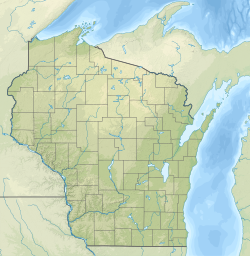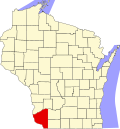2010 census
As of the census [15] of 2010, there were 3,868 people, 1,659 households, and 1,037 families living in the city. The population density was 1,272.4 inhabitants per square mile (491.3/km2). There were 1,805 housing units at an average density of 593.8 per square mile (229.3/km2). The racial makeup of the city was 98.3% White, 0.5% African American, 0.2% Native American, 0.5% Asian, 0.3% from other races, and 0.3% from two or more races. Hispanic or Latino of any race were 0.8% of the population.
There were 1,659 households, of which 28.3% had children under the age of 18 living with them, 49.1% were married couples living together, 9.3% had a female householder with no husband present, 4.0% had a male householder with no wife present, and 37.5% were non-families. 32.4% of all households were made up of individuals, and 16.6% had someone living alone who was 65 years of age or older. The average household size was 2.27 and the average family size was 2.87.
The median age in the city was 41.2 years. 23.6% of residents were under the age of 18; 7.4% were between the ages of 18 and 24; 23.1% were from 25 to 44; 26.1% were from 45 to 64; and 19.8% were 65 years of age or older. The gender makeup of the city was 47.4% male and 52.6% female.
2000 census
As of the census [4] of 2000, there were 4,070 people, 1,706 households, and 1,079 families living in the city. The population density was 1,441.1 people per square mile (557.2/km2). There were 1,799 housing units at an average density of 637.0 per square mile (246.3/km2). The racial makeup of the city was 99.24% White, 0.07% African American, 0.29% Asian, 0.10% from other races, and 0.29% from two or more races. Hispanic or Latino of any race were 0.42% of the population.
There were 1,706 households, out of which 28.3% had children under the age of 18 living with them, 52.8% were married couples living together, 8.0% had a female householder with no husband present, and 36.7% were non-families. 31.8% of all households were made up of individuals, and 18.1% had someone living alone who was 65 years of age or older. The average household size was 2.31 and the average family size was 2.93.
In the city, the population was spread out, with 23.5% under the age of 18, 9.0% from 18 to 24, 25.1% from 25 to 44, 21.9% from 45 to 64, and 20.5% who were 65 years of age or older. The median age was 40 years. For every 100 females, there were 89.3 males. For every 100 females age 18 and over, there were 87.0 males.
The median income for a household in the city was $32,723, and the median income for a family was $47,500. Males had a median income of $30,683 versus $22,331 for females. The per capita income for the city was $17,797. About 6.4% of families and 8.9% of the population were below the poverty line, including 8.9% of those under age 18 and 9.7% of those age 65 or over.








